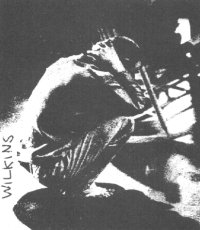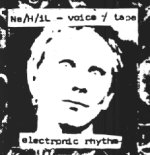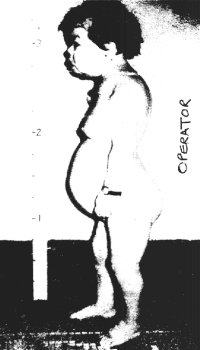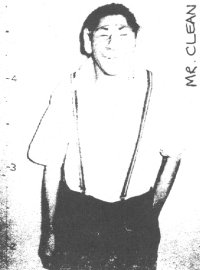
This interview took place after their set at a Final Solution gig in Heaven, Charing Cross, supporting Throbbing Gristle and A Certain Ratio [23.12.80].
Heaven is normally a meat-market gay disco and it must rank as the most sordid venue I have ever been to - I'll certainly have doubts about going there again. It was unbearably hot, smoky and very dark towards the end of the evening it was literally impossible to see from one side of the hall to another. Decor (and background music) rather over-the-top disco. All in all, probably just about sordid enough for a Throbbing Gristle/SPK gig.
Incidentally a couple of years ago this. place used to be called the Global Village and had occasional gigs then too - the last time I saw the Users was in there. My, how it's changed.
I first became interested in Surgical Penis Klinik when their single "Meat Processing Section" came out in the summer last year (although it was recorded in their native Australia in 1979). This was in fact their second EP, the first (No More/Contact/Germanik) was released on their own label Side Effects Records early in 1979.
Tonight their set was quite an experience, to say the least. It is probably best described as an all-out attack on your senses. First, there was the sheer volume of sound - the constant low-frequency noises that were played at deafeningly loud volume. The sound itself - deliberately loud so as to cause distortion - more like the "Slogan" side of Meat Processing Section than the "Factory" side, but always with the booming low frequency noises in the background, that were missing on the records. The ligbts and the strobes were pointed straight at the AUDIENCE and not the group...
Current line-up:
Operator - Synth/Tapes/Rhythms
Mr Clean - Production engineer
Wilkins - Guitar/Bass
Genesis P-Orridge told me once that this group were the most deranged group that he'd ever come across. After seeing their set, and doing this interview, I almost agree...
Charlie: How long have SPK been going?
Operator: First started in January 1979 I think, but the first time we played together was June l979 and that was with me, a psychiatric nurse, a guy called Nehil who was a mental patient - schizophrenic, and two punk guys we got to help us, who left soon after to become pop stars.
 Charlie: Who with?
Charlie: Who with?Operator: They've got a group of their own in Australia called Secret Secret who are just making a lot of money in the clubs.
Charlie: Are you all Australian?
Operator: No. Wilkins is English, comes from Bristol, and Mr Clean and I don't come from anywhere in particular. We consider ourselves stateless.
Charlie: You were born in Australia, weren't you?
Operator: That's not necessarily true. But don't push it. That's an assumption that we wish to maintain.
Charlie: How many copies did you make of your first single?
Operator: We did two EP's in Australia - three tracks on each - and we made 500 copies of the first one and 500 of the second one, and then we had to do a re-release of 500. Then I came to England on my way to France, to live there - and Genesis of TG wrote to us and said he wanted to do a re-release in England of the second one, so we said yes. The second one has three tracks on the original - the third track was a throwaway which was fucked up after I left and re-mixed by the psycho guy, before he killed himself.
Charlie: He killed himself?
Operator: Yes... and actually recently we had another guitarist who killed himself, so that's why the group's so unstable all the time.
Charlie: Why did they kill themselves?
Operator: Don't know. They didn't tell me. They didn't leave me anything in their wills either, which is annoying.
Charlie: Who writes the lyrics? The words of some of your songs on the first single are a bit over the top.
Operator: Those lyrics were written mainly by Nehil who was the Schizophrenic, but we were working in collaboration all the time. I handled the music, he handled the lyrics. But all the lyrics are over the top. It's just that some of them are sung in German so they'd be over the top to a German, I suppose.
Charlie: There's no point in going over the top in a foreign language.
Operator: Why not?
Charlie: It doesn't seem over the top then.
Operator: But lyrics function as a dictatorial device - if you've got a set of lyrics, they'll tell you what they mean. You've then got no choice about any particular meaning in the piece of sound. So if you write lyrics in German, bad German at that because I can't speak any German, then the audience is free to take whatever meaning they want to from whatever the sound is.
Charlie: Your microphone was very distorted tonight. Was that intentional?
 Operator: No, not particularly, but you can't help it when you've got that much noise going on. You can't get a good mix on a mike like that. Plus I'm shouting quite a lot in German because I like the language - it's a little fetish of mine.
Operator: No, not particularly, but you can't help it when you've got that much noise going on. You can't get a good mix on a mike like that. Plus I'm shouting quite a lot in German because I like the language - it's a little fetish of mine.Charlie: When you sing in German do you understand exactly what you're singing?
Operator: They're translated from an English idea, but they're usually cut up afterwards, so they probably don't mean anything to a German person either.
Charlie: So do you ever wan to play in Germany?
Operator: I have had thoughts about going to Dusseldorf because that's where DAF and Pyrolator are working, but I'm not sure whether I like their stuff anymore, I just don't like England all that much.
Charlie: Then why are you here?
Operator: I don't like places with any characteristics, I'd like a place that didn't have any characteristics, so I wouldn't feel oppressed by any particular culture, or anything like that. I'm not expecting to find anything, though.
Charlie: It's probably freer here than most places, though.
Operator: It depends what you mean by free. A lot of the things we're doing now are about information overload. For example tonight there was a tape which you probably couldn't hear properly because of the distortion, it was a compilation of chemical warfare and side-effects of psychotropic drugs which is an indication that if we're all excited about chemical warfare, it in effect started in mental hospitals in 1952, with people subjected to it all the time. Another case is a cut-up between several porno loops, hard core and the soft core that you get on advertisements, so we packed them all together, which is the state that you have in the so-called free society. You're just bombarded with shit all the time. And that's what we're saying. We're not trying to dictate any particular set of lyrics to anybody at all.
Charlie: So what kind of a place would you want to live in?
Operator: We'll all end up living eventually inside the head. A head without a world. I have no material needs at all - I live on £5 a week. In London that is some achievement, so they tell me.
 Charlie: Do you ever get bored?
Charlie: Do you ever get bored?Operator: Never. You only get bored if you're expecting something better. And there isn't anything better, everything's the same.
Charlie: Isn't that a negative attitude? I get bored sometimes.
Operator: You must be looking for something. You must have your highs. I think I'm a pluralist to the extent that as much diversity is the best thing. It's categorisation, lines and so on that you get in the music scene in London which kill you. I can contradict myself one second after I've said something, because consistency is just another closed way of thinking.
Charlie: Doesn't consistency mean that you know what you're talking about?
Operator: Consistency generally means sticking to a set line, for example Marxist or left wing line, left wing / right wing - it's all the same - everybody's realising that now.
Charlie: Well I believe in some things and not in others.
Operator: Noem Chomsky, who's a really left wing linguist just signed a manifesto of the Fascist party in France saying that they should be allowed to continue. Because he says it's the only way it'll be controllable - there's no point in trying to stamp it out, that's the way to go about things. That's the way I think.
Charlie: Allowing any party to exist doesn't necessarily mean that you agree with what they are saying.
Operator: Exactly. That's why I wouldn't follow either opinion. One day I'd say that not allowing it to happen is OK. You can't make a decision either way. On any subject. It might help to fill in a bit of background here on why I think this way - it comes from experience in mental hospitals where no decision is ever right. For a schizophrenic person, for example, there's nothing you can do or say to a schizophrenic person that will help them, and being silent doesn't help them either. So what do you do
Charlie: What experience have you had with schizophrenic patients?
Operator: In general... I worked with a lot of alcoholics... senile dementia... manic depressive psychosis... schizophrenia... Schizophrenics are quite interesting. It's a series of superimposed masks with no personality behind - all they can do is switch from one to the other. They're not happy with any of them - they're unhappy with any of them. It's just a series of options - they don't believe in any one of them, they don't think any one of them is better than the other - they don't have anything behind it to stabilize on.
Charlie: Do you identify with them in any way?
Operator: Yes. There is considerable biological evidence that there is an entire schizophrenic system in everybody which surfaces more dramatically in some than in others. Yes, I think most people are schizophrenic to a certain extent. Not the classic split personality bullshit, but in the sense that at times the overcoating devices, the rationalities just break down and they'll go haywire - go crazy. One of our songs is called Retard, about a guy who just went crazy-killed somebody - no motive, nothing at all. He's spent thirty-five years in a mental hospital, paying for it. They couldn't have let him out though, he might have done it again. It's these dilemmas, no-win situations which intrigue me. That's what our music's about.
Charlie: So what are you intending to do now, as a group?
Operator: We'd like to do another gig, on our own, cos we were fucked around a lot tonight. When we were playing, in what position, and all this sort of thing - in other words we were shoved to side and they forgot about us. Not that I mind - I just don't like feeling some asshole's pushing me around. I didn't complain, or anything like that, but I'd rather control it myself.
Charlie: Where would you want to play?
Operator: Interesting venues, hopefully. Not the Marquee, or that sort of stuff. I'm looking into... they've started to rent out the old World War Two underground shelters under London. There's a huge network of them. I'd like to play down there, and if anybody got tired they could wander off and have a look. Some are run by the GLC, some by the police. They're useful for storage, mostly. But anywhere that comes up, I'm willing to play. I got approached by a guy tonight waning to put us on a compilation album of futurism, like Eric Random and Naked Lunch and stuff... I don't want to be labelled as futurist, just like I don't want to be labelled with Industrial.
Charlie: So you won't be doing anything more with Industrial?
Operator: I don't think so, no. It's a mutual agreement, we don't want to lump everything together - we want to diversify.
Charlie: Why did you release that second single on Industrial?
Operator: Publicity really. I couldn't afford to do it . It's not money, I think I made £15 out of the whole thing, even though they didn't have any pressing charges. We sold quite a few but I never saw any money - but that doesn't bother me because it was only to get a name.
Charlie: It didn't get much publicity in the music press.
Operator: It only got mentioned in Sounds - one line, it didn't get mentioned in the NME or Melody Maker, possibly because they had their big strike at exactly the time it was released.
Charlie: Would you have wanted more mentions?
Operator: Oh no, not really. It's a very difficult situation where you're trying to stay underground but still get a few people to know you. It's a situation where you say you want exactly 5000 people, no more and no less, any more and you're selling yourself and any less and you're wasting your time. It's difficult, cos you've got to tread that line all the time.
Charlie: So what about the future?
Operator: It depends on everybody else really. I'd like to diversify and do video, and maybe do some soundtracks for the video, I'm also writing two books, one on music, one on words - it's a hybrid of philosophy and fiction. Just on different types of thought, rather than the narrow ones we're restricted to at the moment. I like violent change, convulsive thought... ripping from one thing to another so nobody can tie you down and say "You are this, you are that", so if you gave me this interview tomorrow I'd probably tell you something completely different.
I didn't do the interview again, so I'll never know now whether that is true. Anyway Surgical Penis Klinik gigs are very thin on the ground to say the least - this was the only one they've done in England so far - so the best way to find out what they're like is to listen to their "Meat Processing Section" single which is still available on Industrial. I prefer the "Factory" side, which I still consider to be one of the best things to be released in 1980. Operator prefers the other side "Slogan" which is probably nearer the live sound.
======================================
Postscript. I went round to operator's place in Vauxhall a couple of weeks after the gig/interview... The group did not want pictures of them to be published, as one of their primary aims is to discourage identification with the star and other heroic images, and promotion of self-importance in individuals... They have shaosen three images, one for each of them. Fourth member 'Tone Generator' rejoining the group from Australia at the time of press.
Chainsaw 11, February 1981

